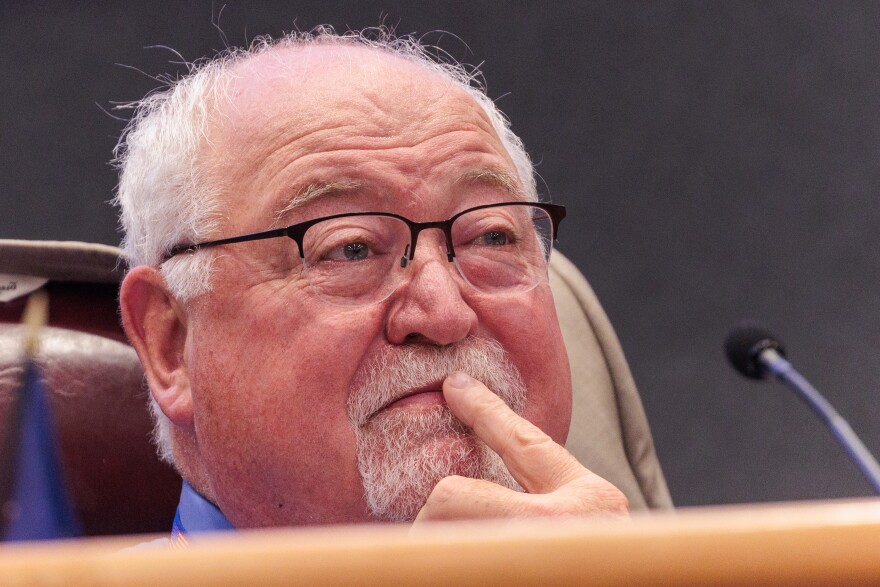Janie Doe, an 11-year-old girl entering seventh grade in Hanover County this fall, would like to play on her school’s tennis team.
However, in a September 3, 2023, letter, Hanover school board chair Bob May told her parents that even though Janie —a pseudonym attorneys provided to protect her identity — had already made the team, the board would reconsider her participation. He said it was because board members learned Janie was assigned male at birth.
May cited the July 18, 2023, release of the Virginia Department of Education’s model policies, "Ensuring Privacy, Dignity and Respect for All Students and Parents in Virginia’s Public Schools." The policies are a guide for school districts to use as they develop their own rules for the treatment of transgender students.
The Hanover school board adopted VDOE’s model policies in November 2023, two months after denying Janie’s spot on the team.
“For any athletic program or activity that is separated by sex, the appropriate participation of students shall be determined by sex rather than gender or gender identity,” the document reads.
On July 3, the ACLU of Virginia sued May and Hanover schools Superintendent Michael Gill in federal court, arguing they’re discriminating against Janie on the basis of her sex and transgender status — a violation of Title IX, the federal civil rights law that bars sex discrimination in schools and education programs that receive federal funding.
A federal judge in Richmond has scheduled a 10 a.m. Aug. 6 hearing to consider the ACLU’s request to immediately stop Hanover from enforcing the rules on transgender athletes and allow Janie to play on the tennis team this fall.

“I think there are two things that make this case really important right now,” said Wyatt Rolla, a transgender rights attorney with the ACLU of Virginia. “One is that there was a recent decision by the 4th Circuit Court of Appeals — that is the federal court that creates binding precedent for Virginia — that found that blanket prohibitions on transgender athletes violate Title IX.”
That case, B.P.J. v. West Virginia State Board of Education, decided in June, involves a 13-year-old West Virginia girl named Becky, who was barred from her school’s cross-country and track teams for girls because she is transgender.
The second reason for the Hanover case, Rolla said, is a dangerous wave of anti-trans legislation and policies targeting young people.
“Actions like [those of] the Hanover County School Board — which singled out our client, bullied and excluded her for the sole reason that she is transgender — are part of a national movement that makes it difficult, if not impossible, for trans young people to exist in our public education systems,” Rolla said.
Neither May nor Gill responded to a VPM News email request for comment. Instead, Chris Whitley, Hanover’s assistant superintendent of community engagement and legislative affairs, responded.
“It’s not the practice of the Hanover School Board or Hanover County Public Schools to comment on pending litigation,” he wrote in an email.
VDOE prompted to create model policies
A 2020 state law directed VDOE to develop model policies for transgender and nonbinary students based on “best practices”.
Former Gov. Ralph Northam, a Democrat, released the first iteration in March 2021. They were largely aimed at protecting the rights of transgender students and encouraged school officials to accept a student’s gender identity.
Transgender rights advocates said the latest policies, promulgated by Republican Gov. Glenn Youngkin’s administration, do the opposite.
The rules ban transgender and nonbinary athletes from playing on teams that align with their gender identity. The policies also direct schools to defer to parents when a student asks to be called a different name or “expresses a gender that differs with a child’s sex while at school,” unless the school believes the student is “at imminent risk of suicide related to parental abuse or neglect.”
Unless the school receives written permission from a parent, personnel are directed to refer to individual students using only the pronouns in the student’s official record.
Conservative organizations have called it a win for “parents’ rights,” free speech and freedom of religion in public schools.
Northam’s policies, however, stressed “privacy and confidentiality are critical for transgender students who do not have supportive families.”
The ACLU of Virginia separately sued VDOE in February on behalf of students who they said were harmed by the adoption and enforcement of the policies. The two cases, filed in York and Hanover counties, will be heard Monday and Aug. 20, respectively.
The ACLU is asking the courts to throw out the policies and rule that school districts are not required to follow them.
“The ACLU of Virginia has, for years, been telling the Virginia Department of Education and school boards that the anti-trans model policies, put out by Governor Youngkin’s Virginia Department of Education, invite school districts to violate state and federal law,” Rolla said. “And that’s exactly what we see [in Hanover].”
Youngkin and Virginia’s Republican attorney general, Jason Miyares, have maintained that school boards must adopt the rules.
Miyares released an advisory opinion in August, in which he concluded the state’s model policies comply with federal and state anti-discrimination laws.
“It is my opinion that the model policies comply with the Equal Protection Clause, Title IX, and the [Virginia Human Rights Act], and that … local school boards are required to adopt policies that are consistent with them,” Miyares wrote.
But compliance, so far, has been mixed.
According to LGBTQ+ advocacy group Equality Virginia, roughly 1 in 5 school districts in the commonwealth had fully adopted the model policies by the end of the 2023-24 school year.
Editor’s note: VPM News and reporter Ben Paviour filed suit in January 2023 in Richmond City Circuit Court against the Virginia Department of Education for public release of these policies in draft form. Both were represented by the Reporters Committee for Freedom of the Press. Read more about the case.



